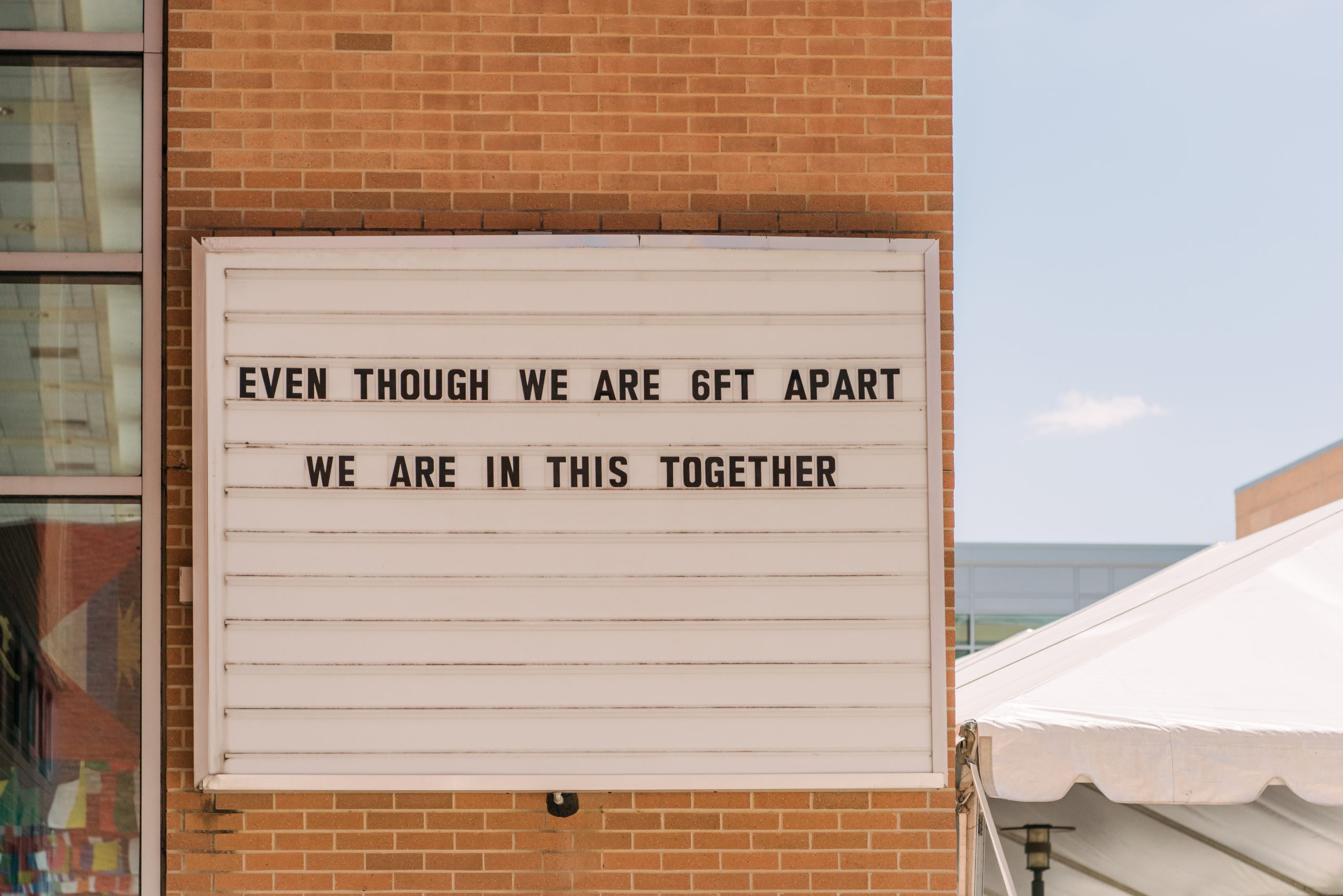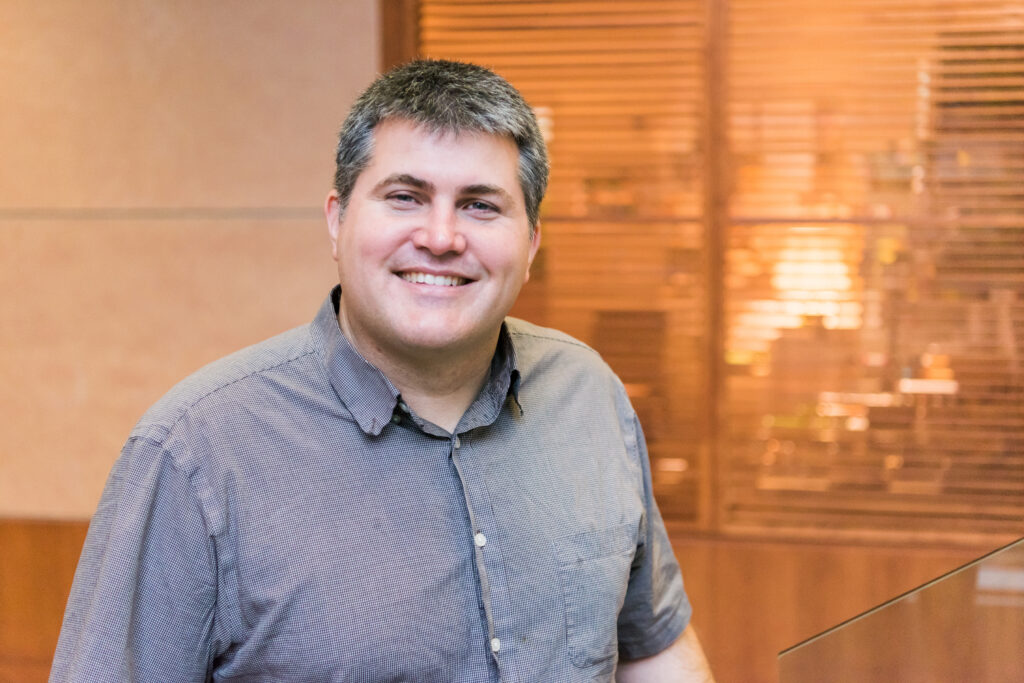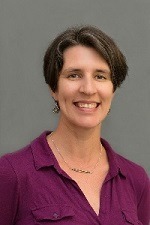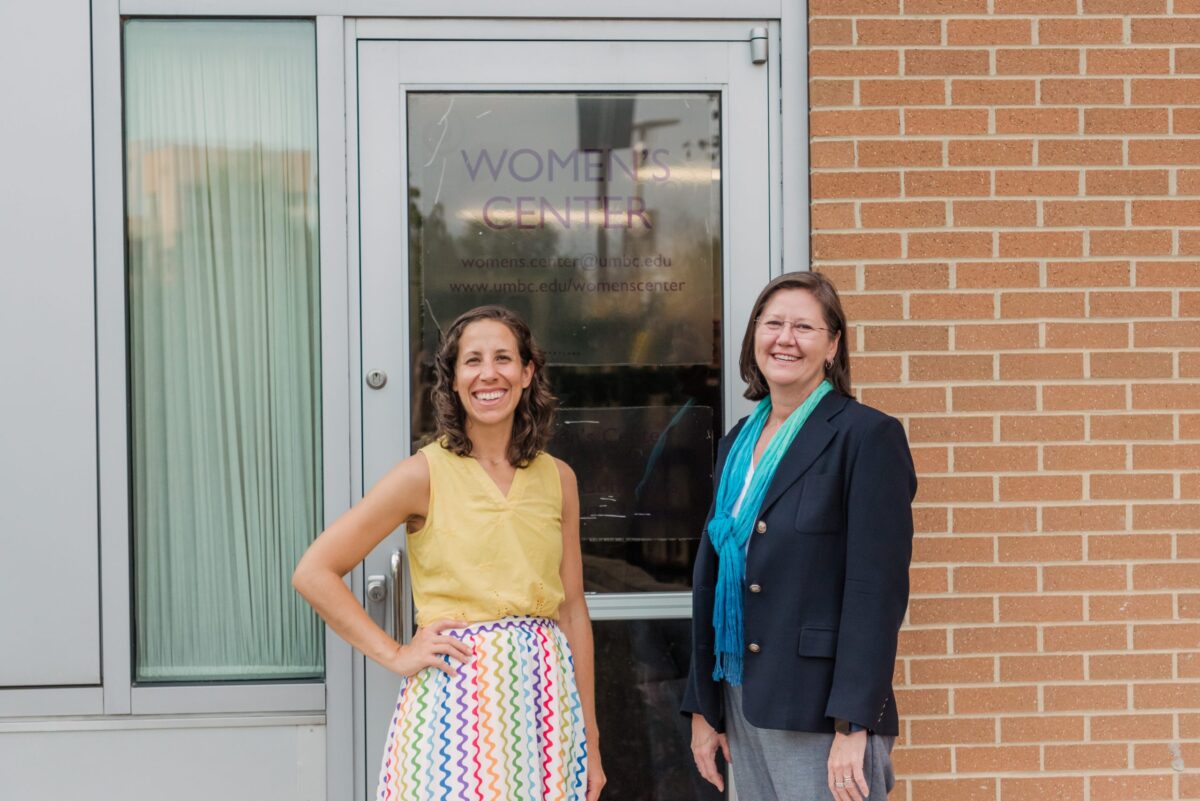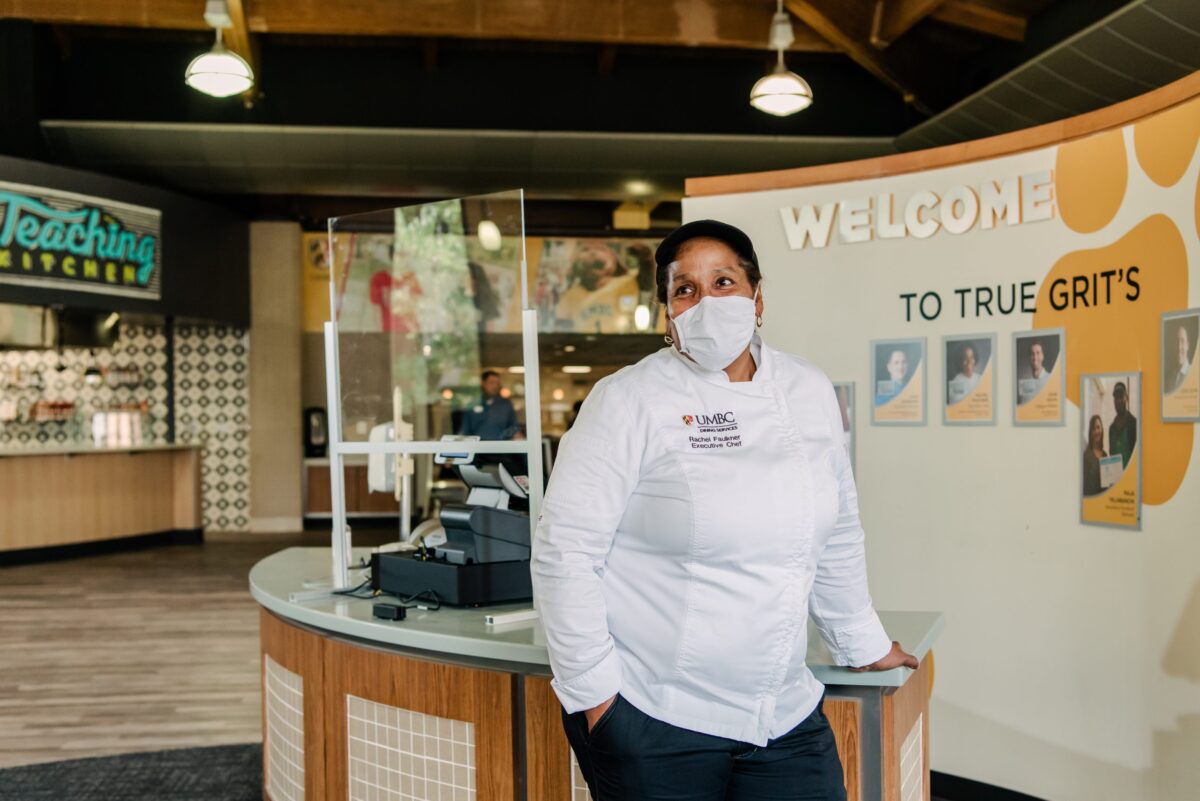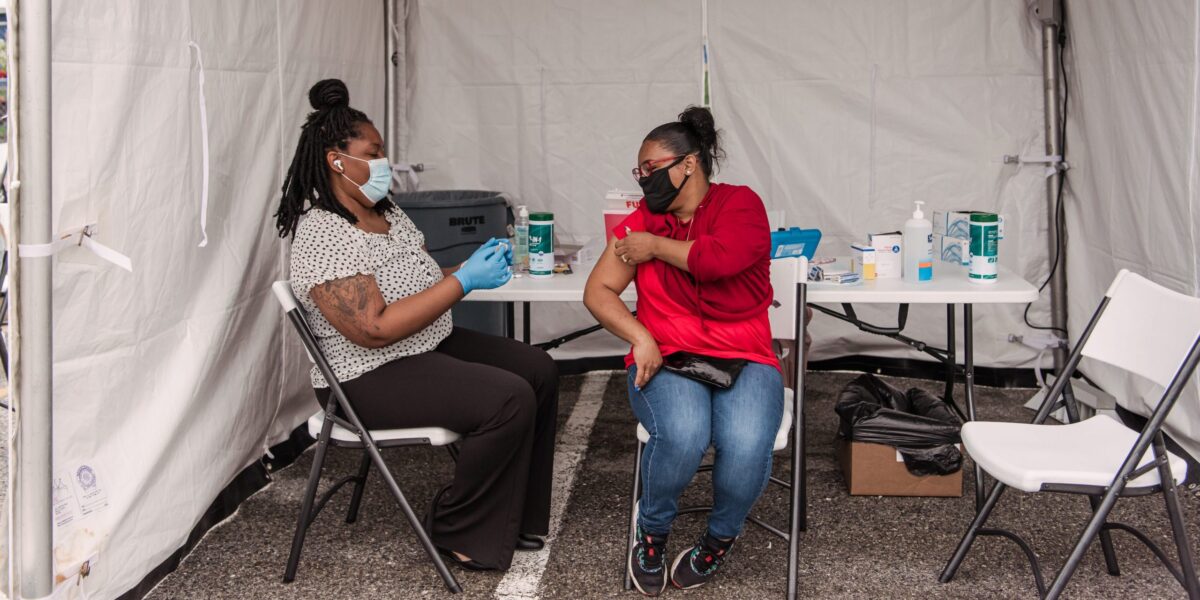This week, Erin Weeks will graduate from UMBC with a degree in biology, a minor in psychology, and her mind set on the next steps of her career.
She will also be closing out one of the most challenging years of her life. During the pandemic, she not only had a baby, but also juggled caring for her mother while completing her final year at UMBC.
“I feel so accomplished—I am excited!” says Weeks, who looks forward to taking part in Commencement with her family, including now almost one-year-old Joshua, Jr.
“I’ve been working towards this degree for almost 9 years. So, it is surreal to actually be crossing the finish line. My family is happy and excited, as well. Everyone keeps telling me how proud they are that I kept pushing and didn’t give up.”
Although the promise of vaccinations and the gradual returns to pre-COVID-19 ways of life loom large, many in the Retriever community are, like Weeks, continuing to balance caretaking with their work and schooling. And more and more—whether they’re caring for children, providing assistance for aging parents, or balancing life with chronic illness—are turning to each other and resources offered by UMBC for support.
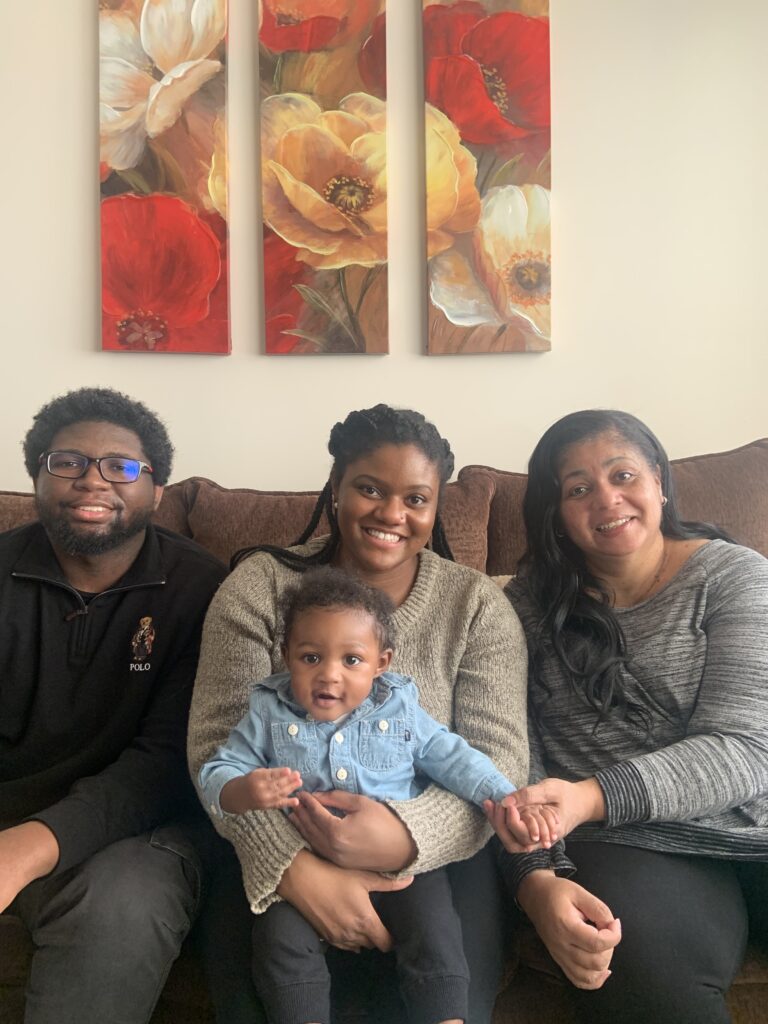
The Parental Balancing Act
Marshall Denise Turner is both a graduate student in UMBC’s master of arts in teaching program and an administrative assistant in the Department of Mathematics and Statistics—as well as the mother of a 7-year-old daughter and 2-year-old son. Finding time for her studies, while also assisting her daughter with school, has been difficult.
“The academic bar is a lot higher now than it was when I was a child, and I was extremely worried because my daughter was not at standard reading level as her kindergarten year was drawing to an end,” she says. “I even faced my own mental distress while trying to figure out the technological, research, and writing expectations of me as a graduate student. I cried many tears during this time because I could not seem to catch a break.”
Turner has relied on UMBC’s preschool both for her toddler, and for her daughter, who Turner enrolled in an academic support class there. While it cost more to do so, she said, it was worth it “compared to the mental struggle of trying to balance everything with no break in sight,” she says. Doing so has also helped her weather the challenges of being a student herself, she says. As tough as it’s been, she’s proud of how resilient she’s become.
As the mother of a 5-year-old and a 9-year-old third grader with special needs, Adrienne Wheeler has learned it’s okay to accept help that is offered—and just as helpful to ignore unsolicited advice from well-meaning folks who could never truly understand her unique challenges.
“I realize that the intent is helpful but it’s very diminishing for someone to think they’ve hit upon the solution…as if I haven’t been mulling the questions for nigh on almost a year. It’s eroding,” says Wheeler, a business specialist with UMBC’s Maryland Institute for Policy, Analysis, and Research.
“The most helpful work resource I’ve had is my set of coworkers…they know what’s needed day-to-day, they’re generous with the time they have, and they give me much-needed grace.”
Adrienne Wheeler
What she does find helpful is the community she’s found through her family and her colleagues at UMBC, she said. (And escaping reality via her beloved comic books when she has a rare moment to herself.) She was also very happy when the pre-k at the Y Preschool at UMBC daycare re-opened this spring.
“The most helpful work resource I’ve had is my set of coworkers…they know what’s needed day-to-day, they’re generous with the time they have, and they give me much-needed grace,” she says. “My sib, Alynn, has also been with me throughout this whole thing. They’ve driven in from Pittsburgh almost weekly for the last 10 months to help my son with school, my daughter with hugs, and me with everything else.”
Mutual Understanding
Although each situation is ultimately different, many have found similarities among their circumstances as caregivers. Both Matt Fagan, assistant professor in geography and environmental systems, and Joanna Gadsby, instruction coordinator and reference librarian, have two kids. Both are extremely grateful for the community pods that give their children chances for socialization—and allow them a bit of catch-up time.
Despite the upsides of their situations, or maybe because of those positives, both Fagan and Gadsby took on roles with a faculty-focused caregiving advisory group in Fall 2020 to try to make things easier on their UMBC colleagues as a whole. (A similar group has been formed to focus on staff issues.)
“The teaching is just hard. It’s hard to have very specific hours that are set and you can’t be with your kids. So if your wife has a work emergency, you can’t help. It’s a big imposition on one’s partner, and it’s just hard,” says Fagan, who is in third-year review for tenure but is also trying to carve out time with his kids, ages 4 and 6. That means relying more on his teaching assistant, offering more virtual office hours, and maintaining an active discussion board.
Gadsby, who has kids in second and fourth grade, has been teaching library instruction and a first-year seminar class. The experience has made her think a lot about how much she “used to outsource for so many kinds of tasks,” she says.
“I’m not just doing my job, and making sure they are doing okay at school, and checking on my parents. I’m also the person who is saying, ‘Did you eat today? Did you drink enough water? Did you get up and take a break? Did you talk to another human? Have you been outside?’” she says. “Normally there are so many more people in our life checking on those kinds of things. Like, ‘Did you participate in class? Did you check on that last assignment? Did you go back to the checklist? Did you ask a friend for his notes?’ It’s exhausting. Now I’m doing what like 25 other people used to do.”
Through their advisory committee, Gadsby and Fagan and others have held listening sessions to better understand how caretakers on the faculty could help each other. They’re also conscious that although vaccinations will begin to open up opportunities, it will take a while for folks to recover from how the pandemic has affected families.
“As hard as everything’s been, I still feel really privileged to be on this committee,” said Gadsby. “We’ve been able to work at home. The kids are able to stay home. We’ve got a pretty good community, so we’re doing okay. And I wanted to be able to do something to try to ease the burden of anyone else right now. It’s just so much.”
Making Time for Self Care
Before the pandemic, Katharine Scrivener was often pretty quiet about her chronic illness at work. But when COVID-19 struck, and work as we knew it turned on its head, she found herself compelled to speak up for herself and others.
Scrivener, the assistant director of alumni and development communications, recently joined a staff-facing caregivers group in order to share her experiences. She hopes that those in her shoes might find care and community just as other types of caregivers may.
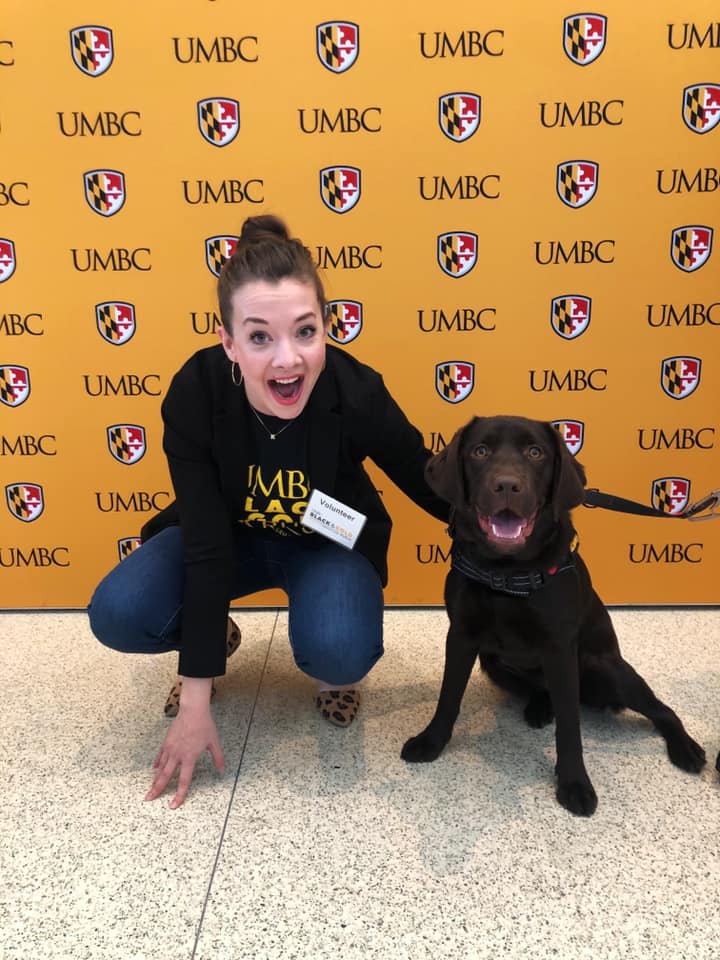
“I’m not sure I had ever really thought about the fact that I could apply the term ‘caregiver’ to myself because I don’t think it’s talked about in that way, even though it really rightfully should be,” says Scrivener, who was diagnosed with cystic fibrosis at age 16.
“And I think part of that is I’ve never found a community at work of people with similar circumstances. And even until this committee, I don’t think I knew very many people at UMBC who maybe dealt with something like this. And so it’s really validating to know I’m not the only one who feels this way or struggles with these things. And I feel I have a sense of connectedness and community I didn’t have before.”
As UMBC begins to plan for return to campus, Scrivener says she hopes the community will learn from the pandemic experience about how best to leverage technology to make the working experience more equitable for those with chronic illnesses. She also hopes to continue to confront ableism as she encounters it.
“I would tell other caregivers that they’re doing a good job…It’s so important to hear that.”
Erin Weeks
“I’m really hopeful that we will continue to be acknowledged and recognized as a part of all of this work that we’re doing about return to campus and flexibility and caregiving and inclusion, and that we can really affect some change,” Scrivener says. “On the one hand, I’m grateful this conversation is happening now. On the other hand, I think I’m a little disappointed it had to take a global pandemic to really look at the fact that remote work and flexible schedules are doable and beneficial to a lot of people.”
Celebrating Successes
With her diploma almost in hand, Weeks is ready to celebrate with her family. But she’s also reflecting on what it has taken to make it through her final year. Patience. Support from her partner. And making the most of whatever free moments she could find to take care of herself—either by taking a walk, or getting some frozen yogurt.
It’s important, she says, to “lean on each other,” and celebrate the resilience born of this moment.
“I would tell other caregivers that they’re doing a good job,” she says. “It’s so important to hear that.”
* * * * *
UMBC is offering a number of resources for caregivers of all types. Join the myUMBC Moms and Parents group to connect and share resources. Or visit the Resources for Parents and Caregivers website for additional caregiver resources.
Header image by Marlayna Demond ’11 for UMBC Magazine.
Tags: Resilience, UMBCTogether

